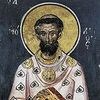Memorial Day of the Hieromartyr Mokios of Amphipolis
The Orthodox Church celebrates the Day of the Hieromartyr Mokios of Anfipolis every year on May 24 The saint, who lived in Macedonia in the 3rd century, was born into a noble family of Roman citizens Mokiya's parents were Christians and raised their son in love for the Lord and fidelity to the faith of Christ, which led him to the rank of priest Until his old age, Presbyter Mokiy preached the word of God among the idolatrous pagans And even during the persecution of Christians that began with the coming to power of Emperor Diocletian, the saint continued his fiery sermons
During the holidays in honor of the pagan god Dionysus, Moky came every day to the main square of the city and tried to reason with its inhabitants Angry idolaters denounced the Christian presbyter to Anthipada Laodicea, adding fabrications and slander to the denunciation Anfipad ordered the preacher to be brought to him, and he began to threaten him with death The saint answered that death for the Lord Jesus Christ is a great good and showed equanimity and fearlessness
The punishment that followed shocked everyone present Mokiya's body remained insensitive to the beatings The torturers who beat the saint began to become exhausted, but the presbyter still remained unharmed Wanting to prove the power of the Lord, the saint raised a prayer to heaven, after which everyone heard thunder and saw the statue of Dionysus collapse Laodicea became even more angry with the captive and ordered him to be thrown into a fiery furnace The flame that broke out did not harm the saint, but burned the tormentors to the ground
The frightened ruler of the city took Mokiya into custody and called another anfipad for interrogation And again the Lord showed a miracle, leaving Mokiya alive and unharmed after torture and torment The whole city witnessed how wild animals clung to the saint, instead of tearing him to pieces Then the rulers of the city, fearing a rebellion, decided not to confuse the people anymore and take the presbyter to Byzantium for execution At the place of his death, the saint heard the voice of the Lord, who promised him the Kingdom of Heaven for the power of faith
Mokius's head was cut off on the 24th day of May; Emperor Constantine established this date as the day of remembrance of the great martyr, building a temple in honor of the saint and transferring the relics of the presbyter there
In folk tradition, the feast of the holy martyr Mokios of Amphiopolis received the epithets Mokry and Mokrosei It was believed that dry weather rarely occurred on this day, and therefore, instead of sowing, they did everyday household chores To preserve the future harvest, straw from Christmas or willow branches from Palm Sunday were burned in the fields Dampness and fog throughout the day foreshadowed a damp, cool summer But the dawn, colored red, indicated the onset of a sultry summer
The saint, who lived in Macedonia in the 3rd century, was born into a noble family of Roman citizens Mokiya's parents were Christians and raised their son in love for the Lord and fidelity to the faith of Christ, which led him to the rank of priest Until his old age, Presbyter Mokiy preached the word of God among the idolatrous pagans And even during the persecution of Christians that began with the coming to power of Emperor Diocletian, the saint continued his fiery sermons
During the holidays in honor of the pagan god Dionysus, Moky came every day to the main square of the city and tried to reason with its inhabitants Angry idolaters denounced the Christian presbyter to Anthipada Laodicea, adding fabrications and slander to the denunciation Anfipad ordered the preacher to be brought to him, and he began to threaten him with death The saint answered that death for the Lord Jesus Christ is a great good and showed equanimity and fearlessness
The punishment that followed shocked everyone present Mokiya's body remained insensitive to the beatings The torturers who beat the saint began to become exhausted, but the presbyter still remained unharmed Wanting to prove the power of the Lord, the saint raised a prayer to heaven, after which everyone heard thunder and saw the statue of Dionysus collapse Laodicea became even more angry with the captive and ordered him to be thrown into a fiery furnace The flame that broke out did not harm the saint, but burned the tormentors to the ground
The frightened ruler of the city took Mokiya into custody and called another anfipad for interrogation And again the Lord showed a miracle, leaving Mokiya alive and unharmed after torture and torment The whole city witnessed how wild animals clung to the saint, instead of tearing him to pieces Then the rulers of the city, fearing a rebellion, decided not to confuse the people anymore and take the presbyter to Byzantium for execution At the place of his death, the saint heard the voice of the Lord, who promised him the Kingdom of Heaven for the power of faith
Mokius's head was cut off on the 24th day of May; Emperor Constantine established this date as the day of remembrance of the great martyr, building a temple in honor of the saint and transferring the relics of the presbyter there
In folk tradition, the feast of the holy martyr Mokios of Amphiopolis received the epithets Mokry and Mokrosei It was believed that dry weather rarely occurred on this day, and therefore, instead of sowing, they did everyday household chores To preserve the future harvest, straw from Christmas or willow branches from Palm Sunday were burned in the fields Dampness and fog throughout the day foreshadowed a damp, cool summer But the dawn, colored red, indicated the onset of a sultry summer